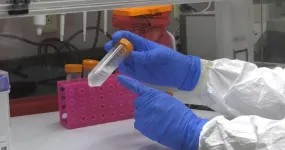(Press-News.org) Key takeaways
Two-thirds of white Americans believe that Black Americans do not experience racism or racial inequities in health care.
UCLA psychologists exposed white study participants to the well-documented history of medical-related mistreatment of Black Americans.
Subsequently, white participants were more likely to adopt a new perspective and support policies aimed at reducing racial disparities in health care.
Being exposed to some of the many historical incidences of anti-Black racism in American health care can contribute to white peoples’ recognition of health disparities currently faced by Black Americans and lead to their support for policies that aim to create more equitable health outcomes, according to UCLA psychologists.
Their findings are published today in the peer-reviewed Journal of Experimental Psychology: General.
Poorer health outcomes for Black Americans, compared with white Americans, are well-documented in many areas, including infant mortality, life expectancy, hypertension, heart disease and breast cancer mortality. However, 67% of white Americans say they do not believe that racism exists for Black Americans in the health care system.
The researchers sought to determine whether white Americans would attempt to understand racial inequities from the perspective of Black Americans after being exposed to history lessons about Black experiences in health care and whether such “perspective-taking” would lead to greater recognition of racism in health care.
Kimberly Martin, who conducted the research as a UCLA doctoral student in social and health psychology, and Kerri Johnson, a UCLA professor of social psychology and communication, recruited 1,853 white participants online for two studies.
In the first, the researchers exposed roughly 400 participants to a “critical Black history” lesson that consisted of photographs and captions illustrating health care injustices experienced by Black Americans from the 1800s to the present. The researchers instructed half of them to try to imagine the “feelings, thoughts and experiences” of the Black person who had been mistreated in history, while the other half were simply told to read the information. Afterward, participants were asked questions about how much they tried to “perspective-take” with Black people and about their thoughts and acknowledgements of the existence of racism in American society.
The researchers found that people who reported higher perspective-taking were also more likely to recognize racism in the present day. The finding was similar whether the participant was instructed to try to take on the perspective of the Black person who had been mistreated in history, or whether they did so spontaneously, without being instructed to do so.
For the second study, about 1,400 participants were divided into three groups, with each group exposed to one of three Black history lessons. Participants in the “critical Black history” group were shown photographs and captions, as in the first study. One example told the story of civil rights activist Fannie Lou Hamer, who in 1961 underwent what was to be a routine tumor-removal procedure during which her uterus was taken out by a white doctor without her consent. The caption also included the broader, systemic context of Hamer’s story, as doctors at that time were disproportionately performing hysterectomies on Black women without consent.
Other photographs in this lesson documented stories of harmful, unconsented-to and even fatal medical experimentation on Black people aimed at advancing medical research — experimentation that was supported by medical and broader national and government agencies.
A second group was exposed to a “celebratory Black history” lesson in which photographs and captions focused on the accomplishments of Black Americans in health care rather than episodes of systemic or individual racism and mistreatment. One photograph, for example, depicted Dr. Patricia Bath, the ophthalmologist who invented laser cataract surgery.
The third group — a control group — saw photographs of Black Americans from the 1800s to the present that included no critical or celebratory information.
After being exposed to the history lesson, participants were asked a series of questions about their level of perspective-taking, their recognition of racism and discrimination, and their support for policies that would reduce racism and health disparities in the U.S. health care system.
The researchers found that the spontaneous perspective-taking that occurred in the first study occurred in the second study after participants were exposed to the critical Black history lesson and was much more prevalent than when exposed to the celebratory Black history or the control lesson.
They also discovered that this led to a recognition among participants that there is individual and systemic racism in the present U.S. health care system, as well as to support for policies that promote equal access to health care for Black Americans and educate the public about the public health impacts of racism.
“The findings have far-reaching impacts toward creating an anti-racist society and a health care system that treats patients more equitably,” said Johnson, the study’s senior author.
Surprisingly, their research also showed that certain false biological stereotypes — such as the belief that Black people are more resistant to pain — persisted, regardless of which lesson participants were exposed to.
“There is overwhelming evidence of the existence of racism in health care and the persistence of stereotypes, but with our work, we aim to demonstrate that there could be ways to intervene, reduce discrimination and create more equitable health care outcomes,” said Martin, who is now a postdoctoral scholar at Yale University.
Martin’s research focuses on developing culturally relevant methods and interventions to reduce discrimination and to increase acknowledgment of and support for addressing racial inequities. One of the next steps in her work is to explore how to change the medical school curriculum and requirements for doctors in ways that will lead to better patient interactions, more referrals for needed screenings and treatments, better trustworthiness and, ultimately, a healthier, more equitable society.
Another key takeaway from the research for the field of social psychology and even more broadly is the value of teaching and learning of history, said Johnson, who noted that learning history promotes perspective-taking that is beneficial to society.
“Efforts to silence stories of oppression,” Martin said, “rob people of the opportunity to gain insights and perspective, particularly about oppressed people. Our evidence suggests that with the study of an accurate history of injustice comes increased perspective-taking and broader support for a more equitable, just society.”
END
Learning critical Black history can change white perspectives on racism in health care
UCLA study shows it can also spur support for policies aimed at equity
2023-09-29
ELSE PRESS RELEASES FROM THIS DATE:
Exciting news: 11 more journals indexed in CABI
2023-09-29
Maximum Academic Press (MAP) is pleased to announce that 11 more journals including Circular Agricultural Systems, Food Innovation and Advances, Food Materials Research, Fruit Research, Grass Research, Medicinal Plant Biology, Ornamental Plant Research, Seed Biology, Technology in Horticulture, Tropical Plants and Vegetable Research have achieved a significant milestone by being indexed in the CABI (Centre for Agriculture and Biosciences International) database. Previously, Beverage Plant Research, Forestry Research and Studies in ...
Life satisfaction may not enhance cognitive functioning among some older adults
2023-09-28
Numerous studies have shown that leading a fulfilling and satisfying life may improve cognitive function by encouraging health-protective behaviors such as physical activity and reduced stress. Many of these studies assess this relationship from a population level, rather than among individuals.
But a closer look within the general population suggests that life satisfaction may not have a positive effect on all people, according to a new study led by Boston University School of Public Health researchers.
Published in the journal SSM – Mental Health, the ...
Childbirth associated with significant medical debt
2023-09-28
ANN ARBOR, Mich. – For some families, the year after childbirth may not only mean loads of diapers but stacks of unpaid medical bills as well.
Postpartum individuals are more likely to have medical debt than those who are pregnant, suggests a new Michigan Medicine led study that evaluated collections among a statewide commercially insured cohort of 14,560 pregnant people and 12,157 people in the postpartum period.
“Our findings suggest that current out-of-pocket costs before and after childbirth ...
Every participant counts
2023-09-28
Experimental researchers often find themselves of two minds when interacting with the public. On one side, researchers gather knowledge and test hypotheses based on participants’ responses. On the other side, they use their own knowledge and expertise to engage and educate the public about topics of public concern related to their science.
Abby Walker, associate professor of linguistics in the Department of English at Virginia Tech, and her collaborator secured a National Science Foundation ...
Higher patient satisfaction after breast reconstruction using patients' own tissues
2023-09-28
September 28, 2023 – Women undergoing autologous breast reconstruction – in which the breast is reconstructed using the patient's own tissues– report higher satisfaction with their breasts at follow-up, compared to those undergoing implant-based reconstruction, reports a study in a special October supplement to Plastic and Reconstructive Surgery®, the official medical journal of the American Society of Plastic Surgeons (ASPS). The journal is published in the Lippincott portfolio by Wolters Kluwer.
"The findings were unexpected, since autologous ...
Roundtable on ensuring ethical and equitable artificial intelligence and machine learning practices
2023-09-28
The National Alliance against Disparities in Patient Health (NADPH) presents a Roundtable Discussion on the topic of embedding ethics and equity into artificial intelligence (AI) and machine learning (ML) infrastructure. The expert panel discussion is published in the peer-reviewed journal Big Data. Click here to read the article now.
Moderating the Roundtable Discussion is Malaika Simmons, MSHE, Chief Operating Officer of NADPH. The expert panelists include Rachele Hendricks-Sturrup, DHSc, Chief Data Governance Officer and Project Director, NADPH, Gabriella Waters, Director of Research and Operations, Center for Equitable AI and Machine Learning Systems, Director of the ...
Skin behind the ears and between the toes can host a collection of unhealthy microbes
2023-09-28
WASHINGTON (Sept. 28, 2023) — Grandmother was right: Scrubbing behind the ears and between the toes may help keep the skin in those regions healthy, or so says a new study by a team at the George Washington University.
The microbiome, or the collection of microbes living on and in the human body, are known to play a role in human health and the skin is no different. A new study by a team at the George Washington University has shown that the composition of the skin microbiome varies across dry, moist and oily regions of the skin.
Researchers ...
Indigenous community-first approach to more ethical microbiome research
2023-09-28
UNIVERSITY PARK, Pa. — Every person hosts trillions of microorganisms, like bacteria and viruses, on their skin and in organs including those that make up the digestive tract, like their mouth, that collectively make up their microbiome. Microbiome research can lead to medical breakthroughs to treat diseases like inflammatory bowel syndrome and diabetes. According to Laura Weyrich, associate professor of anthropology and bioethics at Penn State, microbiome samples from Indigenous communities have played an important role in furthering Western ...
How parents’ work stress affects family mealtimes and children’s development
2023-09-28
URBANA, Ill. – Family mealtimes are important for parents and children as a space to communicate, socialize, and build attachment relationships. But it can be difficult for busy parents to balance family and work life. A new study from the University of Illinois Urbana-Champaign explores how parents’ job stress influences their attendance at family mealtimes, and in turn, children’s socioemotional development.
“We all struggle to maintain the balance between work life and family life. But this might ...
Walking more than five flights of stairs a day can cut risk of heart disease by 20%, study says
2023-09-28
Forget walking 10,000 steps a day. Taking at least 50 steps climbing stairs each day could significantly slash your risk of heart disease, according to a new study from Tulane University.
The study, published in Atherosclerosis, found that climbing more than five flights of stairs daily could reduce risk of cardiovascular disease by 20%.
Atherosclerotic cardiovascular disease (ASCVD) along with coronary artery disease and stroke are the leading causes of morbidity and mortality worldwide.
“Short bursts of high-intensity stair climbing are a time-efficient ...
LAST 30 PRESS RELEASES:
A kaleidoscope of cosmic collisions: the new catalogue of gravitational signals from LIGO, Virgo and KAGRA
New catalog more than doubles the number of gravitational-wave detections made by LIGO, Virgo, and KAGRA observatories
Antifibrotic drug shows promise for premature ovarian insufficiency
Altered copper metabolism is a crucial factor in inflammatory bone diseases
Real-time imaging of microplastics in the body improves understanding of health risks
Reconstructing the world’s ant diversity in 3D
UMD entomologist helps bring the world’s ant diversity to life in 3D imagery
ESA’s Mars orbiters watch solar superstorm hit the Red Planet
The secret lives of catalysts: How microscopic networks power reactions
Molecular ‘catapult’ fires electrons at the limits of physics
Researcher finds evidence supporting sucrose can help manage painful procedures in infants
New study identifies key factors supporting indigenous well-being
Bureaucracy Index 2026: Business sector hit hardest
ECMWF’s portable global forecasting model OpenIFS now available for all
Yale study challenges notion that aging means decline, finds many older adults improve over time
Korean researchers enable early detection of brain disorders with a single drop of saliva!
Swipe right, but safer
Duke-NUS scientists identify more effective way to detect poultry viruses in live markets
Low-intensity treadmill exercise preconditioning mitigates post-stroke injury in mouse models
How moss helped solve a grave-robbing mystery
How much sleep do teens get? Six-seven hours.
Patients regain weight rapidly after stopping weight loss drugs – but still keep off a quarter of weight lost
GLP-1 diabetes drugs linked to reduced risk of addiction and substance-related death
Councils face industry legal threats for campaigns warning against wood burning stoves
GLP-1 medications get at the heart of addiction: study
Global trauma study highlights shared learning as interest in whole blood resurges
Almost a third of Gen Z men agree a wife should obey her husband
Trapping light on thermal photodetectors shatters speed records
New review highlights the future of tubular solid oxide fuel cells for clean energy systems
Pig farm ammonia pollution may indirectly accelerate climate warming, new study finds
[Press-News.org] Learning critical Black history can change white perspectives on racism in health careUCLA study shows it can also spur support for policies aimed at equity




